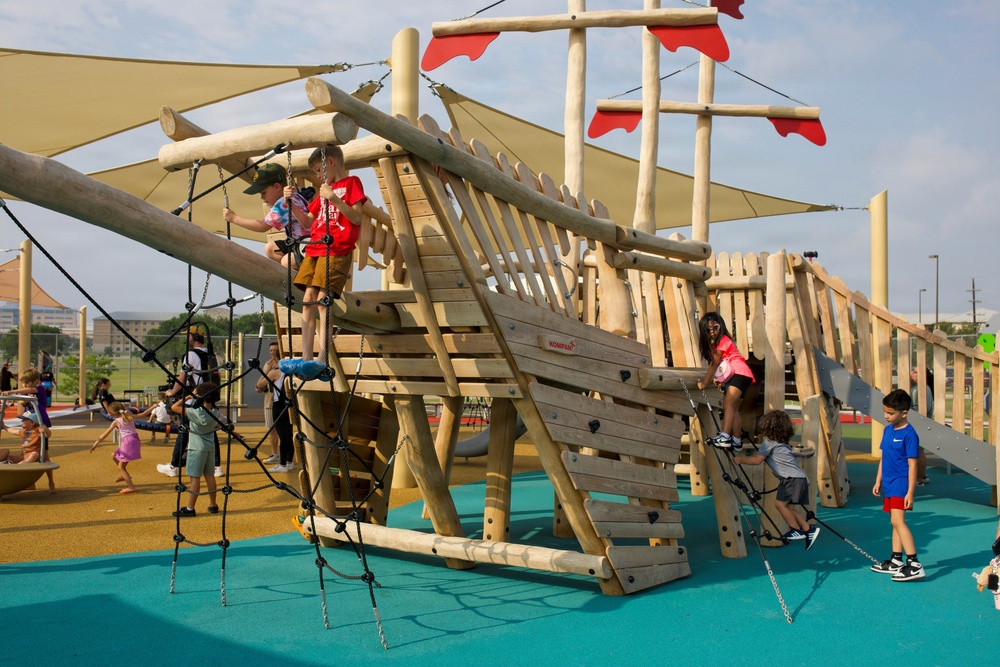Purdue ROTC, US Space Force partner on resources, scholarships
WEST LAFAYETTE, Ind. — Purdue University, known as “the cradle of astronauts,” will now be a nurturing ground for the U.S. Space Force — the newest military branch.
Purdue President Mitch Daniels Wednesday joined Gen. David “DT” Thompson, vice chief of space operations for the U.S. Space Force, to announce a new agreement that would extend the university’s legacy in space.
Daniels heralded the university’s rich history of space contribution, through specialized academics and its alumni, as an obvious reason for Purdue’s participation in the U.S. Space Force.
“The U.S. Space Force is a testament that this nation has put in place assets that not only protect us,” said Daniels, “but also benefit our lives.”
The U.S. Space Force became the sixth branch of the armed forces, established Dec. 20, 2019, under the Trump Administration.
By signing the agreement, during an event held outdoors on the steps of Hovde Hall, the Space Force will use university research and innovation while investing in scholarships for qualified students interested in such a pursuit.
“The terms basically talk about both Purdue and the Space Force developing mutually additional programs in specific areas,” said Thompson, who holds a master’s degree in engineering from Purdue. “The first is, the Space Force commits to enhancing participation in what has been the Air Force ROTC program.
‘Boiler up!’:Sirisha Bandla brought Purdue flag aboard Virgin Galactic spaceflight
“The ROTC program is building a space-specific curriculum, and we will provide additional officers and leaders for that program, and we will provide additional scholarships and additional opportunities for ROTC members from Purdue University to join the space program,” Thompson said.
“We have very specific and select needs for those leaders,” Thompson said, “and Purdue is going to provide additional resources.”
The second piece of the agreement involves the Space Force partnering closely through the branch’s chief scientists for research operations with Purdue, Thompson said.
“Purdue has a long history of research, space-related research we’ve provided through the Air Force in the past, we’ve provided through NASA,” Thompson added. “We are going to grow first of all the dollars and the topics of research interest for Purdue University and ask back that we be allowed to provide our own researchers to come to advance those initiatives.”
Thompson did not put a dollar amount on the agreement but said that the military would invest in those ROTC members through scholarships.
“Purdue has on the other side of that,” Thompson said, “offered through its schools and through things like the Purdue Military Research Institute, their commitment to grow those programs and grow the infrastructure that would allow us to do that.”
Purdue, deemed “the cradle of astronauts” because of the number of alumni who’ve traveled into space, joined universities across the country committing to such an agreement with the U.S. Space Force. The University of North Dakota became the first institution to join the branch’s efforts.
“The Space Force faces some of the toughest challenges in engineering, science, and technology,” Gen. John W. “Jay” Raymond, Chief of Space Operations, said Aug. 9 in Grand Forks, ND, according to a release.
“Space is hard. We need our nation’s brightest minds working to help us tackle these problems. That is why we have established the University Partnership Program to harness the innovation at universities across our country. Today, I’m excited to welcome the University of North Dakota as our first official UPP member, with ten more schools to follow in the coming months.,” Raymond stated in the news release last month.
According to the branch’s website, the universities on track to join the partnership in fiscal year 2021 are:
- University of North Dakota
- Georgia Institute of Technology
- Howard University
- Massachusetts Institute of Technology
- North Carolina Agricultural and Technical State University
- Purdue University
- University of Colorado at Boulder
- University of Colorado Springs
- University of Texas at Austin
- University of Texas at El Paso
- University of Southern California
In conjunction with the signing ceremony in Grand Forks, the military cited in a release the program’s four main goals:
- Establish opportunities for world-class research, advanced academic degrees, and workforce and leadership development for U.S. Space Force Guardians
- Identify and pursue research areas of mutual interest with member universities, individually and collectively
- Establish scholarship, internship and mentorship opportunities for university students and ROTC cadets
- Recruit and develop diverse officer, enlisted, and civilian Guardians with a particular focus on science, technology, engineering and mathematics
Deanna Watson is the executive editor at the Journal & Courier. Contact her at [email protected]. Follow her on Twitter at @deannawatson66.



![DVIDS – Images – Travis AFB takes first step in dorm renovation project [Image 1 of 5] DVIDS – Images – Travis AFB takes first step in dorm renovation project [Image 1 of 5]](https://101veterans.com/wp-content/uploads/2026/01/1767981620_1000w_q95.jpg)